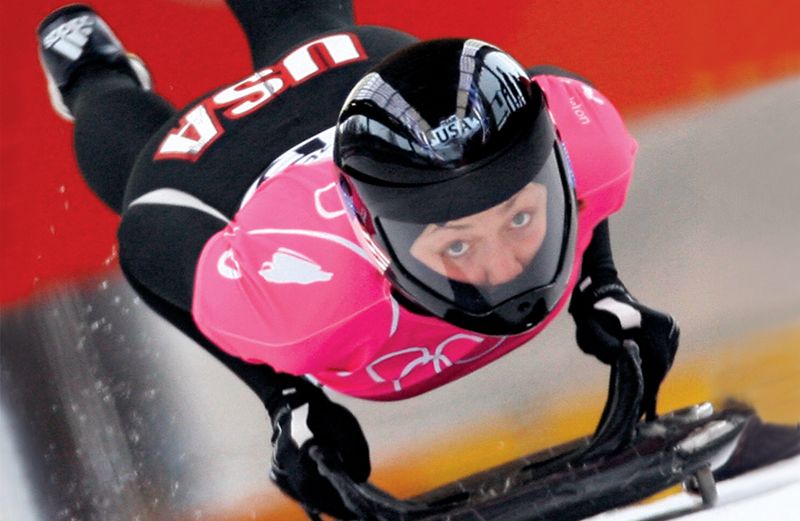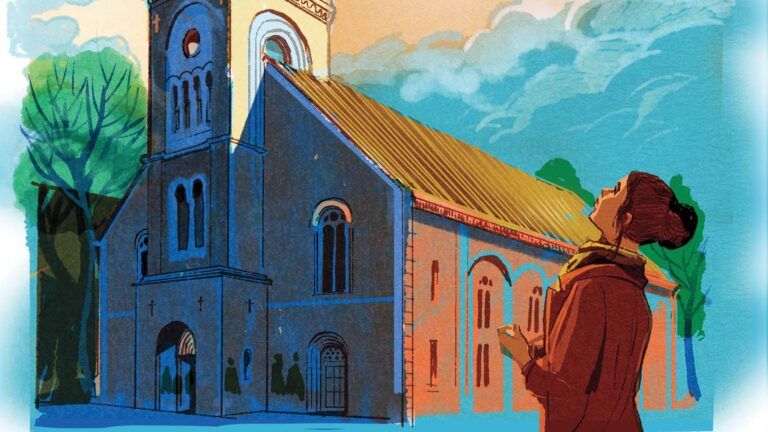February 19, 2010. the Winter Olympics. Whistler Sliding Center, Vancouver. The last heat of the women’s skeleton. I stand at the top of the nearly milelong track, the crisp winter air chilling my lungs. “U.S.A! U.S.A.!” the crowd cheers.
You’ve got this, Katie, I think. I put one hand on my sled and crouch in position.
The starting buzzer sounds…and I’m off! I sprint as fast as I can, then bam, I dive headfirst onto my sled. Like a missile, I fly along the frozen track, the roaring of the crowd drowned out by the sound of my sled scraping the ice.
The wind whips around my body. But after a few seconds, I hear nothing. I’m totally in the zone, chasing the speed.
Less than a minute later, I bump the wall near the last curve. A mistake. It drags my pace down. Way down. At the end of my run, the scoreboard reads “Uhlaender, 11.” As in eleventh place.
I’d lost out on a medal. On my Olympic dream. And you know what? Part of me didn’t care. Because one year earlier I lost the most important person in my life: my father. My biggest fan. My inspiration. What did any of this matter without him?
I grew up in Breckinridge, Colorado. My mother was a ski instructor and my father, Ted Uhlaender, was a Major League baseball player–an outfielder with the Twins, the Indians and the Reds. My three brothers, my sister and I all inherited their competitive passion.
Right from the start, I was a daddy’s girl. Don’t get me wrong, Dad didn’t pamper me. Far from it! He never let me win, not even a game of cards. Instead, he showed me how to get better. How to never, ever give up. How to constantly challenge myself.
And when I wanted to play on an all-boys Little League team, he backed me. “I’ll help you if you help yourself”–that was his motto.
I leaned on God too. Even at that young age, I felt like he had a plan for my life. I talked to him often, praying that he would guide my steps…and my adventures.
By high school, I got into more extreme sports: freestyle skiing, snowboarding, kiteboarding. To stay in shape, I worked out at the rec center. That’s where I met a girl who was a bobsledder.
“I’m actually learning this thing called skeleton,” she said. “Why don’t you try it?”
“What’s that?” I asked.
“It’s like sledding face-first down the bobsled track,” she said. It sounded gnarly. Primal. And, even to me, a little scary! But that made me want to try it even more.
A few days later I went with her to a practice. First I tried the half-mile track, then worked up to the mile. What a rush! It was the most fun I’d ever had.
I told Mom and Dad about my new hobby. “Typical Katie!” Mom said, laughing. “Do you know how dangerous that is?”
It was dangerous. Okay, and crazy too. But Dad understood. He even managed to find a comparison between skeleton and baseball.
“You know, Katie,” he told me. “The first time I walked to the plate for the Twins at Yankee Stadium, Mickey Mantle stood watching in the outfield. My knees shook! In that batter’s box, really, I was on my own.
"It’s like skeleton. Once you get on that sled, the team ain’t helping you. So if you love it, go for it.”
And I did. I trained hard every day. Six weeks later I won my first competition: the Junior Nationals. A few months later, I won the Nationals too. Then came the 2006-2007 and 2007- 2008 World Cup wins.
By then Dad was enjoying retirement on our family’s 800-acre farm in Kansas–tending to cows, fixing fences, digging ditches. Farm life wasn’t my thing, but it was Dad’s passion, his playing field after baseball.
“One day, I’ll show you what this life is all about,” he’d tell me. But he hardly ever missed a race. If he wasn’t there, I’d call him. No one could put me in the right state of mind like he could.
“You’re a warrior!” he’d say, revving me up.
“Yeah! I’m a warrior!” I’d say back.
“I’m so proud of you!” he’d add. It always did the trick.
I made it all the way to the 2006 Olympic Games in Torino. Like always I gave 100 percent. Still, I came in sixth. It only fueled my desire to compete again, to win. And Dad, my ultimate cheerleader, believed I would.
Then, in February 2008, Dad was diagnosed with multiple myeloma. I fell into a straight panic, like going down a mountain in free fall. I was angry at life, at cancer, at God. Why him? Why now?
I couldn’t make sense of anything. I was off track–literally. I lost focus and in my next few races, I didn’t place. Dad noticed.
“Why aren’t you winning?” he asked, calling me one night.
“Because I don’t want to be here!” I cried. “I want to be with you!”
“You need to get that out of your head,” he said. “It’s your responsibility to compete as the number one athlete in this country.”
It wasn’t easy, but I listened to Dad. I visited him as often I could between training and racing. A year later his doctors put him on a new treatment plan. He seemed to be doing a lot better.
On February 12, 2009, I was at the World Cup championships in Park City, Utah. An hour before the race–as usual–I called Dad, who was back on the farm.
“Are you ready to chase gravity?” he asked. “Ready to be crazy?”
“Yes!” I shouted. “I’m a warrior!”
“That’s right! So don’t worry about me!”
Then he told me he loved me over and over. “I love you too, Dad,” I said. It was just the boost I needed.
I came in second place. On the podium, I clasped the medal around my neck and thought of Dad, of my family. I was one step closer to my dream of going to the Olympics again. Then, when I walked off, I was given the news: A few hours earlier, Dad had had a heart attack. He didn’t survive.
I was gutted. No more prerace talks, no more watching baseball games together or visits to the farm, no more anything. I’d lost my anchor.
“Lord, why did you take him?” I yelled. But the Lord was silent.
About a month after Dad died I was snowmobiling with some friends, trying to escape my grief. We were ready to leave when I spotted another hill. Steep. Ominous. Dangerous.
I called out to Dad, “You’d tell me not to do this…but I’m going to do it, because I can!” The snowmobile took a nosedive, throwing me straight into the cowling of the machine. My kneecap shattered instantly.
I underwent four surgeries and extensive rehab. All because I’d been reckless and angry, as if my competitive spirit had turned into a kind of rage. But how else was I supposed to be? How else was I supposed to live and compete without Dad?
And now here I was at the Vancouver Olympics, finishing in eleventh place. Not exactly a dream come true. I wasn’t a warrior. I was a failure. I’d let myself down, and worst of all, let Dad down.
Lord, I prayed that night, help me get past this anger, this pain. Help me to be the Katie Dad always believed I could be.
A couple of weeks later, my older brother and I went to Dad’s farm for the first time since he passed away, to help get things in order. When we pulled into the driveway and I saw the spread–the old wooden barn, the acres of land, the cattle–I felt Dad’s spirit all around me.
This is where I need to be, I thought.
So during the off-season, that’s right where I went. I’d train at 5:30 in the morning, work on the farm for 12 hours–rounding up cattle, baling hay, repairing fences, whatever chores needed doing–then train some more.
The work was never-ending and every day was different from the day before. It was pure. Simple. Hard. Beautiful. And, like Dad, I fell completely in love with it, with the incredible challenge of it.
Little by little, I began to let go. Of my grief, the anger, the bitterness toward God, who had given me the greatest earthly father I could ever have had. I relied on the tools Dad gave me: perseverance, the fortitude to help myself, the will to never, ever give up.
And I haven’t. You will see me at the top of the hill at the Winter Olympics in Sochi. Ready to chase gravity. Ready to be a warrior. Ready to make Dad proud.
Watch as U.S. Winter Olympic hopefuls share quotes that have inspired them!
Listen as Olympic gold-medalist Hannah Kearney describes her passion for mogul skiing!
Download your FREE ebook, The Power of Hope: 7 Inspirational Stories of People Rediscovering Faith, Hope and Love






